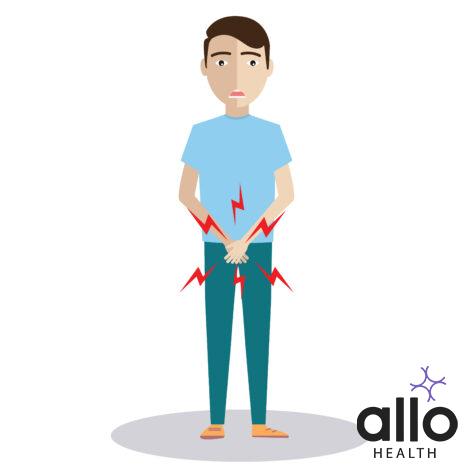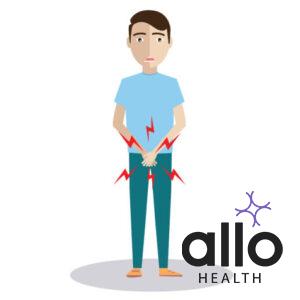How to Delay Ejaculation: Tips and Techniques for Lasting Longer In Bed

Allo Health is dedicated to personalized well-being, offering support and trusted information tailored to individual health goals. The platform emphasizes human-generated content, led by a distinguished medical team of experts, including physicians and sexual health specialists. Their commitment to credibility involves rigorous fact-checking, authoritative research, and continuous updates to ensure accurate, up-to-date information. Allo Health's unique approach goes beyond conventional platforms, providing expert-led insights and a continuous commitment to excellence, with user feedback playing a crucial role in shaping the platform's authoritative voice.

Dr. Aditi completed her undergraduate medical education at AJIMS, Mangalore, after which she worked in multi-speciality hospitals with COVID patients and in the Pain and Palliative medicine department. Driven by her experiences, she developed a keen interest in psychiatry. Dr. Aditi believes that mental health is just as, if not more important, than physical health.
Why This Was Upated?
Our experts continually monitor the health and wellness space, and we update our articles when new information became available.
Updated on 19 June, 2024
- Article was updated as part of our commitment to diversity, equity, and inclusion.

"The following blog article discusses exercise and its potential benefits for general health and well-being. However, it is important to understand that the information provided is for general educational purposes only and should not be considered as personalized exercise advice or a substitute for professional guidance from a qualified fitness professional or healthcare provider. Before starting or modifying any exercise program, it is recommended to consult with a qualified fitness professional.
Book consultation
The information presented in this article may not be suitable for everyone, as individual fitness levels, health conditions, and limitations can vary significantly. A qualified fitness professional can assess your specific fitness needs, consider any medical concerns or limitations, and provide personalized recommendations and exercise plans that are safe and effective for you.
Participating in physical activity, including exercise, carries inherent risks. It is crucial to listen to your body, exercise within your personal limits, and be aware of any signs of discomfort or potential injury. If you experience any pain, dizziness, shortness of breath, or other concerning symptoms during exercise, it is important to stop immediately and seek medical attention if necessary.
The exercises or activities mentioned in this article may not be suitable for individuals with specific medical conditions, injuries, or physical limitations."
Premature ejaculation is a common concern among men, and can result in feelings of embarrassment and shame. Fortunately, there are many techniques and strategies that can significantly increase sexual endurance and prolong sexual pleasure. In this article, we will explore the causes and symptoms of premature ejaculation, and will provide an in-depth guide to delaying ejaculation with practical tips for mind and body. Read on to discover the benefits of delaying ejaculation, common myths about premature ejaculation, and the top 10 techniques for lasting longer in bed.

Understanding Premature Ejaculation: Causes and Symptoms
Premature ejaculation (PE) is a common sexual dysfunction characterized by the inability to control or delay ejaculation during sexual activity. It is estimated that PE affects approximately 20-30% of men at some point in their lives.
The Science Behind Premature Ejaculation
Premature ejaculation (PE) is a health condition that involves various physiological, psychological, and interpersonal factors Here are some key aspects of the science behind premature ejaculation:
Neurotransmitters: The balance of neurotransmitters in the brain, particularly serotonin, dopamine, and norepinephrine, plays a role in ejaculation control. Serotonin, in particular, has been associated with delaying ejaculation. Low levels of serotonin or alterations in the sensitivity of serotonin receptors may contribute to PE.
Central Nervous System (CNS): The central nervous system, specifically areas of the brain involved in sexual response, such as the hypothalamus and limbic system, play a significant role in regulating ejaculation. These regions integrate sensory input, emotional factors, and motor responses to control the timing of ejaculation.
Reflex Pathway: Ejaculation is a reflex mediated by a complex interplay of sensory and motor pathways. The sensory signals from the genital region are transmitted to the spinal cord, and motor signals are sent back to the genital muscles, resulting in ejaculation. Alterations in this reflex pathway can contribute to premature ejaculation.
Genetic Factors: There is evidence to suggest a genetic component in PE. Certain genetic variations and polymorphisms have been associated with an increased risk of developing PE. However, more research is needed to fully understand the genetic basis of PE.
Psychological and Emotional Factors: Psychological factors, such as performance anxiety, stress, relationship issues, and negative sexual experiences, can influence ejaculation control. These factors can lead to heightened arousal, hyperfocus on performance, and disrupted communication between the brain and the sexual response system.
Conditioning and Learned Behavior: Early sexual experiences and conditioning can impact ejaculatory control. For example, if a person has previously rushed through sexual encounters due to fear or anxiety, this pattern may persist and contribute to PE later in life.
It’s important to note that the specific causes and mechanisms of PE can vary among individuals. Additionally, PE can be a combination of physiological and psychological factors interacting with each other.
Causes of Premature Ejaculation
Premature ejaculation (PE) can have various causes, including both psychological and physiological factors. Here are some common causes of premature ejaculation:
Psychological Factors
Performance Anxiety: Anxiety about sexual performance, fear of failure, or concerns about satisfying one’s partner can contribute to PE.
Stress and Emotional Factors: High levels of stress, depression, guilt, or relationship issues can affect sexual performance and ejaculation control.
Early Sexual Experiences: Negative or traumatic early sexual experiences, such as rushed or secretive encounters, can impact later sexual functioning and contribute to PE.
Body Image Issues: Poor body image or low self-esteem may lead to increased anxiety during sexual activity, potentially triggering premature ejaculation.
Physiological Factors
Abnormal Neurotransmitter Levels: Imbalances in neurotransmitters, particularly serotonin, dopamine, and norepinephrine, can affect ejaculation control.
Hormonal Imbalances: Disturbances in hormone levels, such as low testosterone or high levels of thyroid hormones, may contribute to PE.
Prostate or Urethral Problems: Inflammation or infection in the prostate or urethra can result in heightened sensitivity and rapid ejaculation.
Genetic Factors: Some individuals may have a genetic predisposition to PE, although the specific genes involved are still being studied.
Behavioral and Conditioning Factors
Masturbation Habits: Rapid and rushed masturbation practices, often done in adolescence, can condition the body to reach orgasm quickly, leading to PE later on.
Infrequent Sexual Activity: Long periods of sexual inactivity or infrequent sexual encounters can increase the sensitivity and arousal, potentially resulting in PE.
Erectile Dysfunction (ED): Men with ED may ejaculate quickly to avoid losing their erection, which can be a contributing factor to PE.
Symptoms of Premature Ejaculation
Here are some key symptoms associated with PE:
Ejaculation Occurring Too Quickly: The main symptom of PE is the consistent and recurrent occurrence of ejaculation happening before the individual desires it. This may happen shortly after penetration, even before or within a minute of sexual activity.
Lack of Control: Individuals with PE often report a lack of control over their ejaculation, feeling unable to delay it despite efforts to prolong sexual activity.
Distress or Frustration: PE can cause significant distress, frustration, and a sense of dissatisfaction in individuals and their partners. It can lead to decreased sexual satisfaction, reduced self-esteem, and relationship difficulties.
Interference with Sexual Relationships: PE can strain sexual relationships, as the rapid ejaculation may leave one or both partners feeling unsatisfied or frustrated. It can disrupt intimacy, cause communication issues, and contribute to emotional stress within the relationship.
Anxiety and Avoidance: PE can trigger anxiety and fear of sexual encounters, leading to a cycle of avoidance or withdrawal from sexual activity to prevent the occurrence of premature ejaculation.
It’s important to note that occasional instances of premature ejaculation are normal and not necessarily indicative of a problem. However, when these symptoms are persistent, recurrent, and cause distress, it may be diagnosed as PE. Seeking advice from a healthcare professional or a sexual health specialist can provide further evaluation, support, and treatment options to address the condition.
The Benefits of Delaying Ejaculation
Delayed ejaculation can offer several benefits for individuals and their partners. Here are some potential benefits of delaying ejaculation:
Increased Sexual Pleasure: Delaying ejaculation allows for prolonged sexual activity, which can lead to increased pleasure and satisfaction for both partners. It allows more time for exploration, foreplay, and intimacy, enhancing the overall sexual experience.
Enhanced Intimacy: By prolonging sexual activity, delaying ejaculation can deepen the emotional and physical connection between partners. It provides an opportunity for increased intimacy, bonding, and mutual exploration of pleasure.
Increased Partner Satisfaction: By delaying ejaculation, individuals can focus more on their partner’s pleasure and satisfaction. This can lead to a more fulfilling sexual experience for both individuals, as it allows for a balanced exchange of pleasure and ensures that both partners’ needs are met.
Reduced Performance Anxiety: Premature ejaculation can cause performance anxiety and stress. By learning to delay ejaculation, individuals can gain more confidence in their sexual abilities, reduce anxiety, and enjoy a more relaxed and fulfilling sexual experience.
Improved Communication and Relationship Dynamics: Practicing techniques to delay ejaculation often involves open communication and mutual understanding between partners. This can foster better communication about sexual desires, needs, and boundaries, leading to improved relationship dynamics both inside and outside the bedroom.
Increased Self-Confidence: Successfully delaying ejaculation can boost self-confidence and self-esteem. It provides a sense of mastery over one’s sexual responses and can positively impact overall sexual self-assurance.
Variety and Exploration: Delaying ejaculation encourages individuals and their partners to explore different sexual activities and techniques to prolong pleasure. This can lead to a greater variety of sexual experiences, novelty, and excitement in the relationship.
It’s important to note that the benefits of delaying ejaculation can vary from person to person, and individual preferences may differ. It’s essential to communicate openly with your partner, be patient with yourself, and explore what works best for you and your relationship. If concerns persist or if premature ejaculation significantly impacts well-being, seeking guidance from a healthcare professional or a sexual health specialist can provide additional support and tailored strategies.
How To Delay Ejaculation : Strategies To Follow
Delayed ejaculation can be a goal for individuals experiencing premature ejaculation (PE) or those looking to prolong sexual activity. While there are various techniques and strategies that can be employed, it’s important to note that results may vary from person to person. Here is an in-depth analysis of methods that can help delay ejaculation:
Stop-Start Technique
The start-stop method is a behavioral technique commonly used to manage and improve control over premature ejaculation. It involves temporarily stopping sexual stimulation when you feel the urge to ejaculate, and then resuming once the sensation subsides. Here’s a step-by-step guide on how to practice the start-stop technique:
Begin Sexual Stimulation: Engage in sexual activity with your partner, such as foreplay or intercourse, until you start to feel sexual arousal and are nearing the point of ejaculation.
Recognize the Sensation: Pay close attention to your body and the sensations you are experiencing. Be aware of the build-up of arousal and the imminent urge to ejaculate.
Stop Stimulation: When you feel that you are approaching the point of no return or the point where ejaculation feels inevitable, pause the sexual activity and completely stop all forms of stimulation. This includes ceasing any physical contact or movement.
Relax and Breathe: Take slow, deep breaths and relax your body during the pause. This can help reduce arousal levels and prevent the ejaculatory response from escalating further.
Wait Until Sensation Subsides: Maintain the pause until the urge to ejaculate diminishes. This can take several seconds or even a minute. Focus on maintaining a sense of control and allowing the arousal to decrease.
Resume Sexual Activity: Once the sensation of impending ejaculation has subsided, you can resume sexual activity. Start slowly and gradually increase the intensity or pace, as desired. Repeat the cycle of stimulation and pauses as necessary.
Practice and Persistence: The start-stop technique may require practice and persistence to develop better control over ejaculation. Consistently practicing this technique over time can help you gain more control over your arousal and delay ejaculation.
Remember, communication with your partner is crucial throughout this process. It’s important to discuss and involve your partner in the practice of the start-stop technique to ensure mutual understanding and cooperation. It may also be helpful to combine the start-stop technique with other strategies, such as the squeeze technique or pelvic floor exercises, to enhance ejaculatory control.
Squeeze Technique
Similar to the start-stop technique, the squeeze technique is a behavioral technique commonly used to manage and improve control over premature ejaculation. It involves applying pressure to the base of the penis or the area between the penis and the scrotum (perineum) to temporarily reduce arousal and delay ejaculation. Here’s a step-by-step guide on how to practice the squeeze technique:
Begin Sexual Stimulation: Engage in sexual activity with your partner, such as foreplay or intercourse, until you start to feel sexual arousal and are nearing the point of ejaculation.
Recognize the Sensation: Pay close attention to your body and the sensations you are experiencing. Be aware of the build-up of arousal and the imminent urge to ejaculate.
Apply Pressure: When you feel that you are approaching the point of no return or the point where ejaculation feels inevitable, have your partner or yourself firmly squeeze the base of the penis or the perineum. Use your thumb and index finger to apply the pressure.
Hold the Squeeze: Maintain the pressure for several seconds (typically around 10-20 seconds) or until the urge to ejaculate subsides. The squeeze should be strong enough to temporarily reduce arousal but not so intense as to cause discomfort or pain.
Release and Relax: After the squeeze, release the pressure and allow the arousal to decrease. Take a few deep breaths and relax your body.
Resume Sexual Activity: Once the sensation of impending ejaculation has diminished, you can resume sexual activity. Start slowly and gradually increase the intensity or pace, as desired. Repeat the cycle of stimulation and squeezes as necessary.
Practice and Persistence: The squeeze technique may require practice and persistence to develop better control over ejaculation. Consistently practicing this technique over time can help you gain more control over your arousal and delay ejaculation.
Pelvic Floor Exercises
Pelvic floor exercises, also known as Kegel exercises, can be beneficial in managing and improving control over premature ejaculation (PE). These exercises target the muscles that support the pelvic organs, including the muscles involved in ejaculation. Here’s a step-by-step guide on how to perform pelvic floor exercises for PE:
Identify the Pelvic Floor Muscles: The first step is to identify the pelvic floor muscles. One way to locate these muscles is by attempting to stop the flow of urine midstream. The muscles that help you do this are the pelvic floor muscles.
Empty Your Bladder: Before starting the exercises, make sure your bladder is empty to avoid any discomfort or distractions.
Contract the Pelvic Floor Muscles: Once you have identified the pelvic floor muscles, contract them by squeezing and lifting them upward. Imagine trying to lift your penis or tighten your anus. Focus on contracting the muscles without tensing your abdomen, buttocks, or thighs.
Hold the Contraction: Once you have contracted the pelvic floor muscles, hold the contraction for a few seconds, initially aiming for a count of 3 to 5 seconds. As you progress, gradually increase the duration of the hold to 10 seconds or longer.
Relax the Muscles: After holding the contraction, relax the pelvic floor muscles and allow them to return to their resting state. Rest for a few seconds before repeating the exercise.
Repeat the Exercise: Aim to perform a set of 10 repetitions of pelvic floor contractions, also known as Kegels, in one session. You can gradually increase the number of repetitions over time as you build strength and control.
Practice Regularly: Consistency is key with pelvic floor exercises. Aim to perform these exercises at least three times a day, incorporating them into your daily routine. Over time, as your muscles become stronger, you may be able to reduce the frequency to once or twice a day.
However, there isn’t a great availability of evidential research to support the claim of pelvic floor muscles directly helping PE. It most helps in getting good erections which may further contribute to a better ejaculation time.
Condoms or Desensitizing Creams
Condoms and desensitizing creams are two potential options that can be used to manage and address premature ejaculation (PE). Here’s how they can be utilized:
Condoms: Wearing a condom during sexual activity can help reduce sensitivity and delay ejaculation. Condoms create a barrier between the penis and the vagina, which can decrease stimulation and prolong sexual activity. Additionally, some condoms are specifically designed with thicker material or a desensitizing agent, such as benzocaine, on the inside to further decrease sensation and delay ejaculation. These condoms are often labeled as “delay” or “extended pleasure” condoms.
Desensitizing Creams: Desensitizing creams or sprays contain a mild anesthetic agent, such as lidocaine or prilocaine, which can temporarily reduce penile sensitivity. Applying a desensitizing cream to the penis before sexual activity can help delay ejaculation by numbing the area and prolonging the time it takes to reach orgasm. It’s important to follow the instructions provided with the specific product and use the appropriate amount to avoid excessive numbing or transferring the numbing agent to your partner.
When considering the use of condoms or desensitizing creams for PE, it’s essential to keep the following points in mind:
Effectiveness: Condoms and desensitizing creams can be effective for some individuals in delaying ejaculation. However, their effectiveness may vary from person to person. It’s important to find the approach that works best for you.
Sensation Reduction: Wearing a regular condom and using desensitizing creams reduce penile sensitivity, which can affect the overall sexual experience. It’s important to find the right balance between reducing sensitivity and maintaining pleasurable sensations.
Partner Consideration: It’s crucial to communicate openly with your partner about the desensitizing creams. Ensure that your partner is comfortable with these options and that they don’t experience any adverse effects, such as numbness or irritation.
Personal Preference: Some individuals may prefer natural sensations and intimacy without the use of additional products. It’s important to respect personal preferences and explore other techniques and strategies to manage premature ejaculation if condoms or desensitizing creams are not desired or effective.
Mindfulness and Meditation

Mindfulness and meditation practices can be helpful in managing and addressing premature ejaculation (PE) by promoting relaxation, reducing anxiety, and increasing body awareness. Here’s how mindfulness and meditation techniques can be applied:
Mindful Breathing: Deep, mindful breathing can help you relax and focus your attention on the present moment during sexual activity. When you feel yourself becoming overwhelmed or nearing the point of ejaculation, take slow, deep breaths. Focus on the sensation of the breath entering and leaving your body, allowing it to anchor you in the present moment and calm your nervous system.
Body Scan Meditation: Body scan meditation involves systematically bringing attention to different parts of your body, noticing sensations, and releasing tension. Before or during sexual activity, take a few moments to mentally scan your body from head to toe. Notice any areas of tension or discomfort, and consciously release the tension as you exhale. This can help you relax and become more attuned to bodily sensations during sexual activity.
Sensory Awareness: During sexual activity, engage your senses and bring mindful awareness to the physical sensations you are experiencing. Focus on the touch, sounds, smells, and visual aspects of the moment, allowing yourself to fully immerse in the experience. This can help divert your attention from performance anxiety and enhance overall pleasure.
Non-judgmental Observation: Practice observing your thoughts, emotions, and bodily sensations without judgment during sexual activity. Instead of labeling certain experiences as good or bad, simply observe them as they arise and pass. This helps cultivate a non-judgmental attitude and reduces performance pressure, allowing for a more relaxed and enjoyable sexual experience.
Mindful Communication: Mindful communication with your partner is essential in managing PE. Openly discuss your feelings, needs, and concerns with your partner, fostering a supportive and understanding environment. Effective communication can alleviate anxiety and create space for shared exploration and pleasure.
Mindful Masturbation: Masturbation can be an opportunity to practice mindfulness and develop greater control over ejaculation. During solo practice, focus on the sensations in your body, observe the changes in arousal, and practice prolonging the duration before reaching climax. By bringing mindful awareness to the experience, you can learn to regulate your level of arousal and develop better control over ejaculation.
Communication and Mutual Pleasure
Communication and mutual pleasure are essential components in managing premature ejaculation (PE) and fostering a healthy and satisfying sexual relationship with your partner. Here are some key aspects to consider:
Open and Honest Communication: Establishing open and honest communication with your partner is crucial when dealing with PE. Share your feelings, concerns, and desires with each other. Discuss how PE affects you and how you can work together to address it. Creating a safe and non-judgmental space for communication can help alleviate anxiety and build trust.
Education and Understanding: Educate yourselves about PE together. Learn about the causes, contributing factors, and available treatment options. Understanding the condition as a couple can help you approach it from a supportive and informed standpoint.
Mutual Exploration and Experimentation: Explore different sexual activities, techniques, and positions that can help prolong sexual pleasure for both you and your partner. Experiment with various forms of stimulation and find what works best for both of you. Encourage your partner to communicate their preferences and guide you in ways that bring them pleasure.
Extended Foreplay: Engage in extended foreplay before penetrative sex. Focusing on extended foreplay allows both partners to build arousal gradually and can help alleviate performance pressure. Remember that pleasure can be derived from a variety of activities, including kissing, caressing, oral sex, and manual stimulation.
Mutual Pleasure-Focused Approach: Shift the focus from solely penetrative sex and prioritize mutual pleasure and satisfaction. Place emphasis on pleasuring your partner through oral sex, manual stimulation, or the use of sex toys. By making pleasure the goal rather than solely focusing on intercourse, you can reduce performance anxiety and create a more relaxed sexual environment.
Sensate Focus Exercises: Sensate focus exercises involve exploring touch and sensual experiences without the goal of orgasm or intercourse. This technique allows you and your partner to focus on pleasurable sensations and can help reduce anxiety associated with PE. It promotes relaxation and enhances intimacy.
Patience and Support: Be patient with yourself and your partner throughout the process of managing PE. Remember that it may take time to find effective strategies and approaches. Offer each other support, understanding, and reassurance along the way. Celebrate progress and milestones achieved together.
Remember that every couple is unique, and what works for one may not work for another. It’s important to tailor your approach to suit your specific needs and desires as a couple.
Healthy Diet
Maintaining a healthy lifestyle and consuming a balanced diet can contribute to overall sexual health and well-being. Here are some dietary considerations that may indirectly support ejaculation control:
Nutrient-Rich Foods: Consume a diet that includes a variety of nutrient-rich foods such as fruits, vegetables, whole grains, lean proteins, and healthy fats. These foods provide essential vitamins, minerals, and antioxidants that support overall health and potentially enhance sexual function.
Omega-3 Fatty Acids: Include foods rich in omega-3 fatty acids in your diet. Sources of omega-3s include fatty fish (such as salmon, sardines, and trout), flaxseeds, chia seeds, walnuts, and soybeans. Omega-3 fatty acids have been associated with cardiovascular health, which can indirectly contribute to improved sexual function.
Avoid Excessive Alcohol and Caffeine: Excessive alcohol consumption and high levels of caffeine intake can negatively affect sexual function, including ejaculation control. Limit your alcohol consumption and moderate your caffeine intake to support overall sexual health.
Stay Hydrated: Proper hydration is important for overall health, including sexual function. Ensure you drink an adequate amount of water throughout the day to maintain hydration.
Moderate Salt Intake: Excessive salt intake can contribute to high blood pressure and cardiovascular problems, which may indirectly affect sexual function. Be mindful of your salt intake and aim to consume a moderate amount.
Consider Antioxidant-Rich Foods: Antioxidant-rich foods, such as berries, citrus fruits, dark chocolate, and green leafy vegetables, contain compounds that may support overall health and potentially contribute to improved sexual function.
Seeking Professional Help
If self-help techniques are not effective or if PE significantly impacts your quality of life, it may be beneficial to consult a healthcare professional or a sexual health specialist. They can provide further guidance, evaluate underlying causes, and suggest appropriate medical treatments, such as therapy or medication.
Remember, managing PE requires patience and practice. Delaying ejaculation can have both physical and psychological benefits. Physically, it can lead to longer and more satisfying sexual experiences for both partners. Psychologically, it can help to reduce anxiety and increase confidence in sexual situations.
However, it is also important to remember that there is no “right” or “normal” amount of time for sexual activity, and that communication and mutual pleasure should always be the top priority in any sexual encounter. It is essential to approach the process with a positive mindset and be supportive of yourself or your partner. Additionally, maintaining overall sexual health through a healthy lifestyle, managing stress, and fostering emotional well-being can contribute to better ejaculatory control.
How to Improve Your Sexual Endurance: Tips And Strategies
Improving sexual endurance can enhance the duration and satisfaction of sexual activity. While individual preferences and circumstances vary, here are some general tips and strategies that may help:
Physical Fitness: Regular exercise and maintaining good overall physical health can improve stamina and endurance. Engaging in cardiovascular exercises, such as jogging, swimming, or cycling, can enhance cardiovascular fitness and increase stamina in the bedroom.
Deep Breathing and Relaxation Techniques: Deep breathing and relaxation techniques can help reduce anxiety and enhance control over arousal. When you feel your arousal building, take slow, deep breaths to calm your body and mind. Focusing on your breath can also help distract from overwhelming sensations and prolong sexual activity.
Masturbation Practice: Masturbation can be a useful tool for improving sexual endurance. By engaging in solo practice, you can learn to identify your own arousal levels and practice controlling them. Gradually increase the time it takes to reach orgasm during masturbation to build stamina.
Changing Sexual Positions: Experimenting with different sexual positions can help prolong sexual activity. Some positions, such as the woman-on-top or side-by-side positions, may allow for more control over stimulation and help delay ejaculation.
Communication with Your Partner: Openly communicating with your partner about your sexual needs, desires, and preferences is crucial. Sharing your goals and concerns can foster a supportive and understanding environment, reducing performance anxiety and allowing for more relaxed and enjoyable sexual experiences.
Sensate Focus Technique: Sensate focus is a technique that involves focusing on the physical sensations and pleasure of touch rather than solely focusing on intercourse and orgasm. This technique can help increase sexual awareness, improve control over arousal, and extend sexual encounters.
Practice Mindfulness: Being present in the moment and focusing on the sensations and pleasure during sexual activity can enhance endurance. Mindfulness techniques, such as paying attention to each touch, sound, or smell, can help you stay in the present and delay ejaculation.
Remember, sexual endurance is a personal journey, and results may vary. It’s essential to communicate and explore with your partner, maintain a healthy lifestyle, manage stress, and prioritize emotional well-being for a fulfilling and satisfying sexual experience. If concerns persist or significantly impact your well-being, consider seeking guidance from a healthcare professional or a sexual health specialist.
How to Make Sex More Pleasurable While Delaying Ejaculation
Delaying ejaculation can enhance sexual pleasure for both partners, but it is important to make sex enjoyable and pleasurable throughout sexual activity. Experimenting with different sexual positions, using lubrication, and engaging in foreplay can all contribute to heightened sexual pleasure and prolonged sexual activity. Additionally, open communication with sexual partners can help to ensure that sexual activity is enjoyable and comfortable for both partners.
Another way to make sex more pleasurable while delaying ejaculation is to practice mindfulness and focus on the sensations of the body. This can involve paying attention to the breath, the touch of the partner, and the physical sensations in the body. By staying present in the moment and fully experiencing the sensations of sex, both partners can increase their pleasure and prolong sexual activity.
Frequently Answered Questions
Can delayed ejaculation be cured?
The outcome of treating delayed ejaculation depends on the underlying cause. In many cases, with appropriate treatment and management, improvement in ejaculatory function is possible. However, in some cases, complete resolution may not be achieved, and ongoing management strategies may be necessary.
Can delayed ejaculation affect fertility?
Delayed ejaculation does not typically impact fertility directly, as the ability to ejaculate is separate from the ability to produce sperm. However, delayed ejaculation can affect fertility indirectly if it interferes with sexual activity and conception attempts. In such cases, assisted reproductive techniques may be considered to achieve pregnancy.
Can delayed ejaculation affect sexual satisfaction?
Delayed ejaculation can impact sexual satisfaction, both for the individual experiencing it and their partner. It may prolong sexual activity without reaching climax, leading to frustration, dissatisfaction, and potential relationship difficulties.
Can medications cause delayed ejaculation?
Yes, certain medications, particularly selective serotonin reuptake inhibitors (SSRIs) used to treat conditions like depression or anxiety, can cause delayed ejaculation as a side effect. If medication is suspected to be the cause, consulting with a healthcare professional to discuss possible alternatives or adjustments may be necessary.
Can age be a factor in delayed ejaculation?
Age can potentially contribute to delayed ejaculation, as older individuals may experience changes in sexual response and hormonal levels. However, delayed ejaculation can occur at any age and is not solely attributed to aging.
Can delayed ejaculation be a lifelong condition?
Delayed ejaculation can be either lifelong (present since the onset of sexual activity) or acquired (developed after a period of normal sexual function). Both types can be influenced by various factors, including psychological, physiological, or relationship-related issues.






































